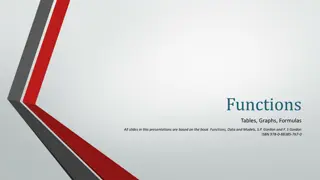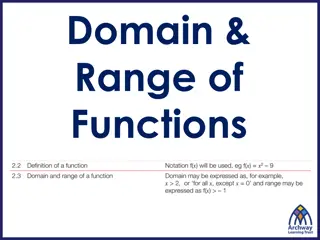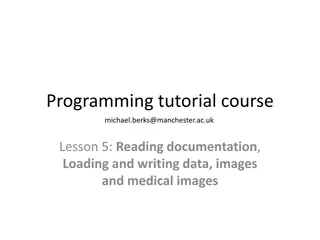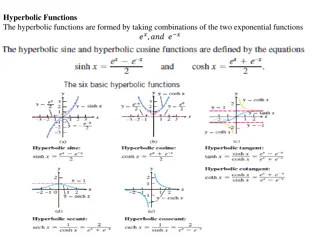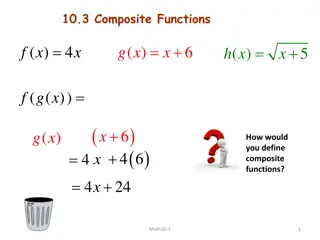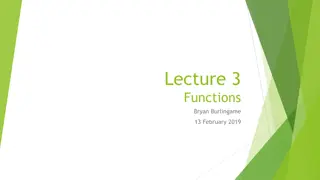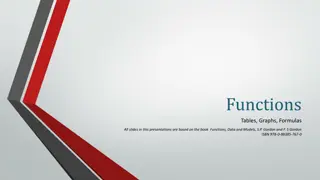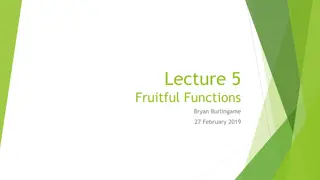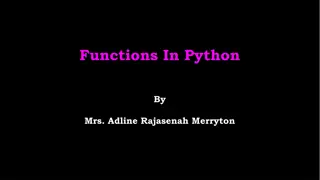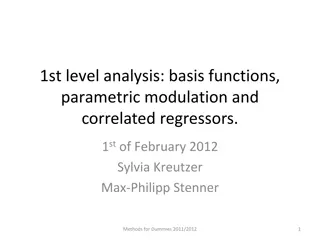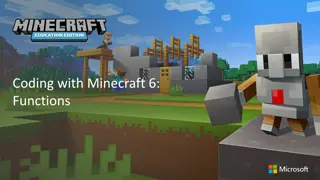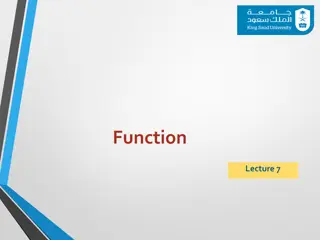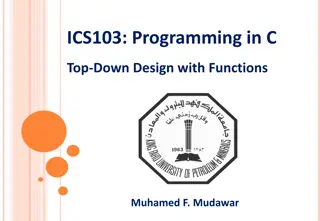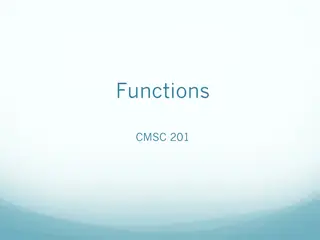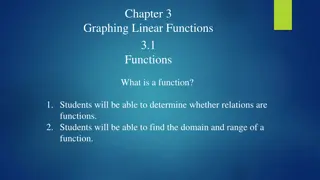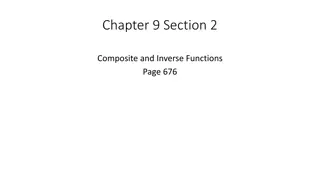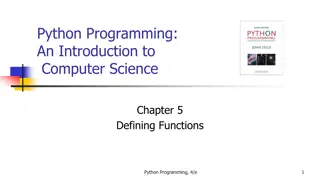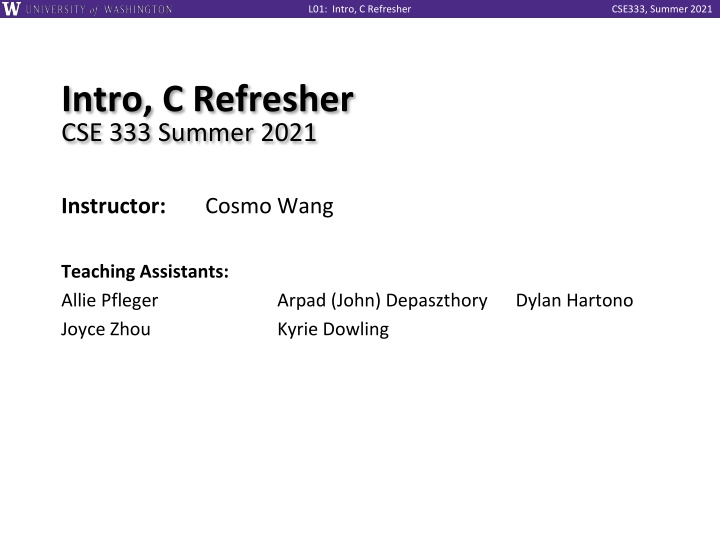
CSE333 Summer 2021: Course Overview and Communication Details
Explore the CSE333 course offerings for Summer 2021, including introductions to instructors and teaching assistants, enrollment details, lecture outlines, course policies, communication channels, and components such as lectures, sections, programming exercises, and projects.
Download Presentation

Please find below an Image/Link to download the presentation.
The content on the website is provided AS IS for your information and personal use only. It may not be sold, licensed, or shared on other websites without obtaining consent from the author. If you encounter any issues during the download, it is possible that the publisher has removed the file from their server.
You are allowed to download the files provided on this website for personal or commercial use, subject to the condition that they are used lawfully. All files are the property of their respective owners.
The content on the website is provided AS IS for your information and personal use only. It may not be sold, licensed, or shared on other websites without obtaining consent from the author.
E N D
Presentation Transcript
L01: Intro, C Refresher CSE333, Summer 2021 Intro, C Refresher CSE 333 Summer 2021 Instructor: Cosmo Wang Teaching Assistants: Allie Pfleger Joyce Zhou Arpad (John) Depaszthory Kyrie Dowling Dylan Hartono
L01: Intro, C Refresher CSE333, Summer 2021 Introductions: Instructors + TAs Instructor: just call me Cosmo UW CSE BS/MS Student I like: teaching, animes, video games, comics, music Cosmo TAs: Allie John Joyce Dylan Kyrie Available in section, office hours, and discussion group An invaluable source of information and help Get to know us (instructors + TAs) We are here to help you succeed! 2
L01: Intro, C Refresher CSE333, Summer 2021 Introductions: Students ~40 students registered Typical summer offering size There are no overload forms or waiting lists for CSE courses Majors must add using the UW system as space becomes available Non-majors should work with undergraduate advisors to handle enrollment details Expected background Prereq: CSE 351 C, pointers, memory model, linker, system calls Indirect Prereq: CSE 143 Classes, Inheritance, Basic Data structures, and general good style practices CSE 391 or Linux skills needed for CSE 351 assumed 3
L01: Intro, C Refresher CSE333, Summer 2021 Lecture Outline Course Policies https://courses.cs.washington.edu/courses/cse333/21su/syllabus.html Digest here, but you must read the full details online Course Introduction C Reintroduction 4
L01: Intro, C Refresher CSE333, Summer 2021 Communication Website: http://cs.uw.edu/333 Schedule, policies, materials, assignments, etc. Discussion:https://edstem.org/us/courses/6531/discussion/ Announcements made here Ask and answer questions staff will monitor and contribute Office Hours: spread throughout the week Can fill out Google Form to schedule individual 1-on-1 appointments Anonymous feedback: Comments about anything related to the course where you would feel better not attaching your name 5
L01: Intro, C Refresher CSE333, Summer 2021 Course Components Lectures (26) Introduce the concepts; take notes!!! Sections (9) Applied concepts, important tools and skills for assignments, clarification of lectures Programming Exercises (12) One due roughly every 4-5 days We are checking for: correctness, memory issues, code style/quality Programming Projects (1+4) Warm-up HW0, then 4 homework that build on each other Reflection Questions (12+4*2) Exercises: one reflection question per exercise Final: two reflection questions per homwork 6
L01: Intro, C Refresher CSE333, Summer 2021 Grading Exercises: 30% total Submitted via GradeScope (under your UW email) Graded on correctness and style by autograders and TAs Projects: 45% total Submitted via GitLab; must tag commit that you want graded Binaries provided if you didn t get previous part working Reflection Questions: 20% total Reflectional and experiential questions on work you have done Course-wide Participation: 5% Many ways to earn credit here, relatively lenient on this More details on course website You must read the syllabus there you are responsible for it 7
L01: Intro, C Refresher CSE333, Summer 2021 Deadlines and Student Conduct Late policies Exercises: no late submissions accepted, due 11 am Homework: 5 late day tokens for quarter, max 2 per homework Need to get things done on time difficult to catch up! Academic Integrity (read the full policy on the web) I trust you implicitly and will follow up if that trust is violated In short: don t attempt to gain credit for something you didn t do and don t help others do so either This does not mean suffer in silence learn from the course staff and peers, talk, share ideas; butdon t share or copy work that is supposed to be yours 8
L01: Intro, C Refresher CSE333, Summer 2021 Getting ahead of stuff Summer is short 9 weeks v.s. 10 weeks for normal quarters Still covering the same amount of content and assignments You really don t want to get behind of stuff Reaching out for help Things have been hard in a remote environment Do not hesitate to reach out for help if you feel you can t catch up We want you to succeed in this course! 9
L01: Intro, C Refresher CSE333, Summer 2021 Lectures & Peer Instructions We will have polling questions for almost every lecture Try to solve the question by yourselves first Discuss with classmates in breakout rooms Respond on Poll Everywhere One way of earning participation credits Graded on completion Can be done asynchronously Sign up for lecture groups on Canvas ASAP https://canvas.uw.edu/courses/1457602/groups#tab-125674 10
L01: Intro, C Refresher CSE333, Summer 2021 Sections Two sections happening at the same time Registration is unbalanced If you re registered for Section AA: You should have gotten an email from me If you re registered for Section AB: No action needed Two sections cover the same material Need to each have a reasonable size (~20 students) 11
L01: Intro, C Refresher CSE333, Summer 2021 Lecture Outline Course Policies https://courses.cs.washington.edu/courses/cse333/21sp/syllabus/ Summary here, but you must read the full details online Course Introduction C Reintroduction 12
L01: Intro, C Refresher CSE333, Summer 2021 Course Map: 100,000 foot view C application C++ application Java application C standard library (glibc) C++ STL/boost/ standard library JRE OS / app interface (system calls) operating system HW/SW interface (x86 + devices) hardware CPU memory storage network GPU clock audio radio peripherals 13
L01: Intro, C Refresher CSE333, Summer 2021 Systems Programming The programming skills, engineering discipline, and knowledge you need to build a system Programming: C / C++ Discipline: testing, debugging, performance analysis Knowledge: long list of interesting topics Concurrency, OS interfaces and semantics, techniques for consistent data management, distributed systems algorithms, Most important: a deep(er) understanding of the layer below 14
L01: Intro, C Refresher CSE333, Summer 2021 STYLE TIP Discipline?!? Cultivate good habits, encourage clean code Coding style conventions Unit testing, code coverage testing, regression testing Documentation (code comments, design docs) Will take you a lifetime to learn, but oh-so-important, especially for systems code Avoid write-once, read-never code Treat assignment submissions in this class as production code Comments must be updated, no commented-out code, no extra (debugging) output 15
L01: Intro, C Refresher CSE333, Summer 2021 Style Grading in 333 A style guideis a set of standards for the writing, formatting, and design of documents in this case, code No style guide is perfect Inherently limiting to coding as a form of expression/art Rules should be motivated (e.g., consistency, performance, safety, readability), even if not everyone agrees In 333, we will use a subset of the Google C++ Style Guide Want you to experience adhering to a style guide Hope you view these more as design decisions to be considered rather than rules to follow to get a grade We acknowledge that judgments of language implicitly encode certain values and not others 16
L01: Intro, C Refresher CSE333, Summer 2021 Lecture Outline Course Policies https://courses.cs.washington.edu/courses/cse333/21sp/syllabus/ Summary here, but you must read the full details online Course Introduction C Reintroduction Workflow, Variables, Functions 17
L01: Intro, C Refresher CSE333, Summer 2021 C Created in 1972 by Dennis Ritchie Designed for creating system software Portable across machine architectures Most recently updated in 1999 (C99) and 2011 (C11) There s also C17, which is a bug-fix version of C11. We will use C17 in this course Characteristics Low-level language that allows us to exploit underlying features of the architecture but easy to fail spectacularly (!) Procedural (not object-oriented) Weakly-typed or type-unsafe Small, basic library compared to Java, C++, most others . 18
L01: Intro, C Refresher CSE333, Summer 2021 C Workflow Editor (emacs, vi) or IDE (VS Code) EDIT Source files (.c, .h) foo.h foo.c bar.c COMPILE (compile + assemble) foo.o bar.o Object files (.o) Statically-linked libraries libZ.a LINK LINK bar libc.so Shared libraries LOAD LINK bar EXECUTE, DEBUG, 19
L01: Intro, C Refresher CSE333, Summer 2021 C to Machine Code void sumstore(int x, int y, int* dest) { *dest = x + y; } C source file (sumstore.c) EDIT C compiler (gcc S) C compiler (gcc c) sumstore: addl %edi,%esi movl %esi,(%rdx) ret Assembly file (sumstore.s) Assembler (gcc -c or as) 400575: 01 fe 89 32 c3 Machine code (sumstore.o) 20
L01: Intro, C Refresher CSE333, Summer 2021 STYLE TIP Generic C Program Layout #include <system_files> #include "local_files" #define macro_namemacro_expr /* declare functions */ /* declare external variables & structs */ int main(int argc, char* argv[]) { /* the innards */ } /* define other functions */ 21
L01: Intro, C Refresher CSE333, Summer 2021 C Syntax: main To get command-line arguments in main, use: int main(int argc, char* argv[]) int main(int argc, char* argv[]) What does this mean? argc contains the number of strings on the command line (the executable name counts as one, plus one for each argument). argv is an array containing pointers to the arguments as strings (more on pointerslater) Example: $ foo hello 87 argc = 3 argv[0]="foo", argv[1]="hello", argv[2]="87" 22
L01: Intro, C Refresher CSE333, Summer 2021 STYLE TIP When Things Go South Errors and Exceptions C does not have exception handling (no try/catch) Errors are returned as integer error codes from functions Standard codes found in stdlib.h: EXIT_SUCCESS (usually 0) and EXIT_FAILURE (non-zero) Return value from main is a status code Because of this, error handling is ugly and inelegant Crashes If you do something bad, you hope to get a segmentation fault (believe it or not, this is the good option) 23
L01: Intro, C Refresher CSE333, Summer 2021 Primitive Types in C Integer types char, int 32-bit 64-bit printf 1 1 2 2 2 2 4 4 4 4 4 8 8 8 4 4 8 8 12 16 4 8 Typical sizes see sizeofs.c C Data Type char %c %hd %hu %d / %i %u %ld %lld %f %lf %Lf %p short int unsigned short int Floating point float, double int unsigned int long int long long int Modifiers short [int] long [int, double] signed [char, int] unsigned [char, int] float double long double pointer 24
L01: Intro, C Refresher CSE333, Summer 2021 STYLE TIP C99 Extended Integer Types Solves the conundrum of how big is an long int? #include <stdint.h> void foo(void) { int8_t a; // exactly 8 bits, signed int16_t b; // exactly 16 bits, signed int32_t c; // exactly 32 bits, signed int64_t d; // exactly 64 bits, signed uint8_t w; // exactly 8 bits, unsigned ... } void sumstore(int x, int y, int* dest) { void sumstore(int32_t x, int32_t y, int32_t* dest) { 25
L01: Intro, C Refresher CSE333, Summer 2021 Function Definitions Generic format: returnType fname(type param1, , type paramN) { // statements } // sum of integers from 1 to max int32_t sumTo(int32_t max) { int32_t i, sum = 0; for (i = 1; i <= max; i++) { sum += i; } return sum; } 26
L01: Intro, C Refresher CSE333, Summer 2021 Function Ordering You shouldn tcall a function that hasn t been declared yet Note: code examples from slides are posted on the course website for you to experiment with! sum_badorder.c int main(int argc, char** argv) { printf("sumTo(5) is: %d\n", sumTo(5)); return EXIT_SUCCESS; } // sum of integers from 1 to max int32_t sumTo(int32_t max) { int32_t i, sum = 0; for (i = 1; i <= max; i++) { sum += i; } return sum; } 27
L01: Intro, C Refresher CSE333, Summer 2021 Solution 1: Reverse Ordering Simple solution; however, imposes ordering restriction on writing functions (who-calls-what?) sum_betterorder.c // sum of integers from 1 to max int32_t sumTo(int32_t max) { int32_t i, sum = 0; for (i = 1; i <= max; i++) { sum += i; } return sum; } int main(int argc, char** argv) { printf("sumTo(5) is: %d\n", sumTo(5)); return EXIT_SUCCESS; } 28
L01: Intro, C Refresher CSE333, Summer 2021 To-do List Make sure you re registered on Canvas, Ed Discussion, Gradescope, and Poll Everywhere All user IDs should be your uw.edu email address Explore the website thoroughly: http://cs.uw.edu/333 Computer setup: CSE lab, attu, or CSE Linux VM Exercise 1 is due 11 am on Friday Find exercise spec on website, submit via Gradescope Course CSE 333 under Summer 2021 , Assignment Exercise 1 , then drag- n-drop file(s)! Sample solution will be posted Friday afternoon Hint: look at documentation for stdlib.h, string.h, and inttypes.h Pre-Quarter survey up on canvas. Due Friday @ 11:59 pm Answers are anonymous. 29


